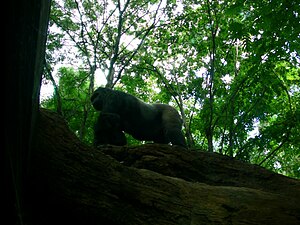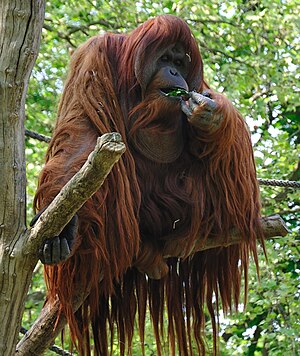User:C6541/subpages/drafts/primate
The word primate has two common definitions:
- In zoology, primate refers to several highly developed species of mammal. Basically, primates have several physical characteristics in common. For instance, they usually have two forward-facing eyes. This allows primates to have vision with depth perception. Having two forward-facing eyes also allows primates to focus at close range on objects -- books for example -- and study them. Most primates can also walk upright over long distances. They also have hands (and sometimes feet) with opposable thumbs, rather than paws, allowing them to grasp, hold and carry objects -- again, books for example. Humans are the most common primates. Other primates include apes, monkeys, and lemurs.
- In religion, primate refers to the top-ranking bishop or archbishop in a province, region or country.
Primates in brief[edit]
Great Apes[edit]
Orangutan[edit]
Orangutans consist of two living species of great ape that exclusively inhabit Asia and are considered the most arboreal members of the great ape family. The Orangutans belong to the genus Pongo and it was initially assumed that the orangutan was a single extant species, but it is now known there are two extant species: the Bornean orangutan (Pongo pygmaeus) and the Sumatran orangutan (Pongo abelii).
The term orangutan is derived from Indonesian and Malay words: orang meaning "person" and hutan meaning "forest" hence orangutan means "person of the forest." Orangutans are considered one of the most intelligent members of the primate family, live for around thirty years, and subsist on a diet of mostly fruit with a smattering of honey, insects and even bark. They are currently listed as endangered species with P. abelii in particular being listed as critically endangered.
Humans and orangutans share approximately 97% of the same genetic information.[1] It is estimated that the human lineage and orangutan lineage diverged approximately 13 million years ago (MYA) , compared to diverging from the chimpanzee lineage around 6 MYA.[2] One controversial study of note has made a claim that in fact orangutans are more closely related to humans than chimpanzees, asserting humans and orangutans share more physical features and that previous genetic studies were flawed. This claim is not widely accepted and the study has been widely panned.[3]
The Pope really is a primate, Mr. O'Reilly![edit]
Confusion about the meaning and the usage of the word "primate" occured on 16 July 2007 when noted Roman Catholic Bill O'Reilly of Fox News became incensed over a posting on the Daily Kos website, calling Pope Benedict XVI a "primate." Fox News dispatched hit-and-run reporter Jesse Watters to interview David Barger, CEO of JetBlue, one of Daily Kos' sponsors. Watters asked Barger a series of questions about Daily Kos' political viewpoints, including several about the statement (posted by on a comment board by one of Daily Kos' readers) that the pope is a primate. If O'Reilly and Watters had bothered to look up the word "primate" in any English language dictionary, they would have seen that the pope -- and every other pope in history -- meets both definitions of "primate". From this encounter we can deduce that the use of -- and familiarity with -- dictionaries is not required to work at Fox News. You only need an amped up sense of righteous indignation. (Perhaps they eschew the use of dictionaries to demonstrate that they are not primates.)
Note to Fox News employees: Dictionaries are a type of book, like the ones mentioned in the "zoology" paragraph above. If you wish to know the definitions to difficult words like "zoology," "lemurs," and "eschew," or to words you think you know the definitions of -- for instance, "fair" and "balanced" -- you'll have to go find a dictionary and look those words up yourselves. For a start, you can go here.
See also[edit]
Footnotes[edit]
[[Category:Animals]] [[Category:Biology]] [[Category:Snark]] [[Category:Zoology]]


